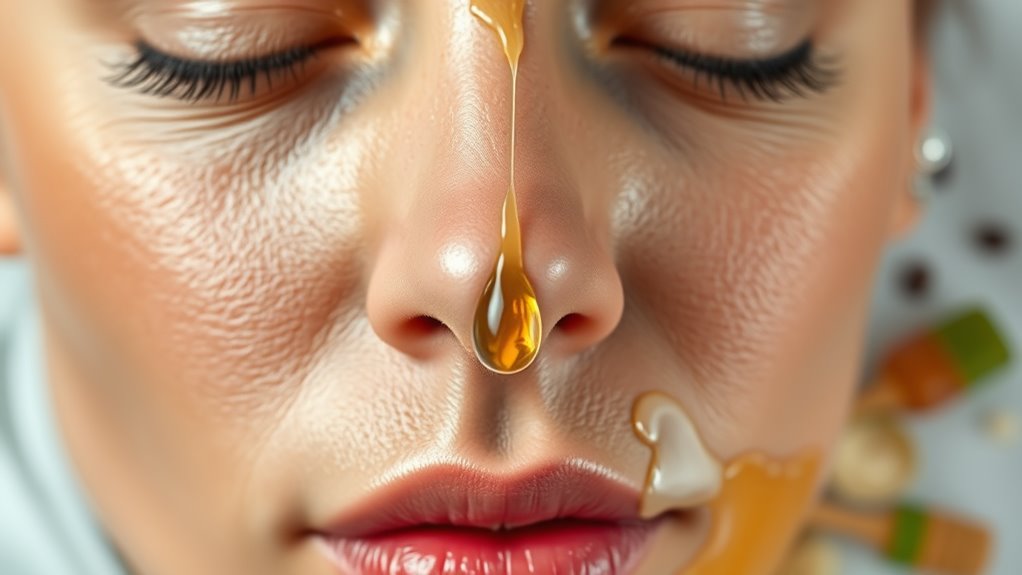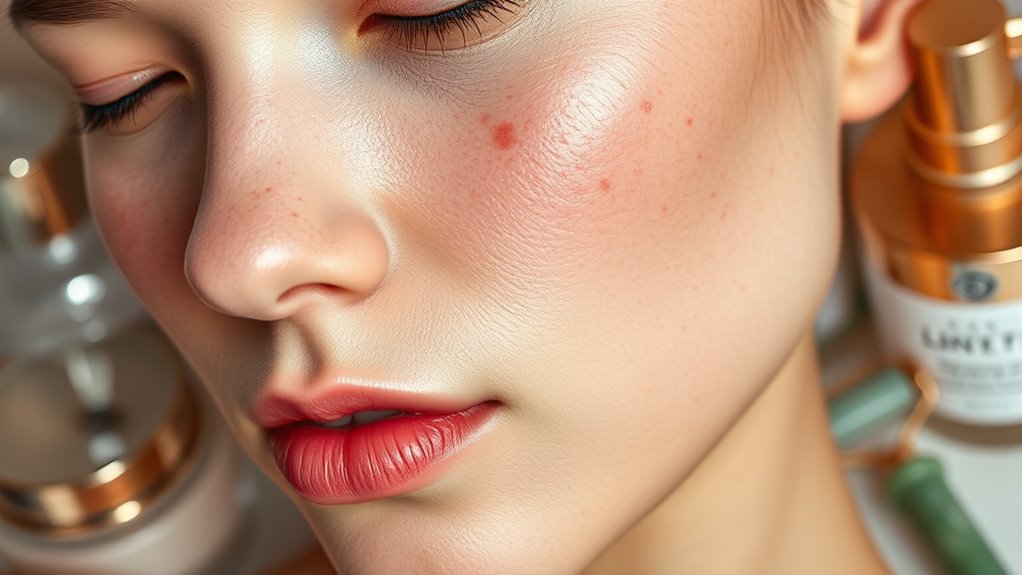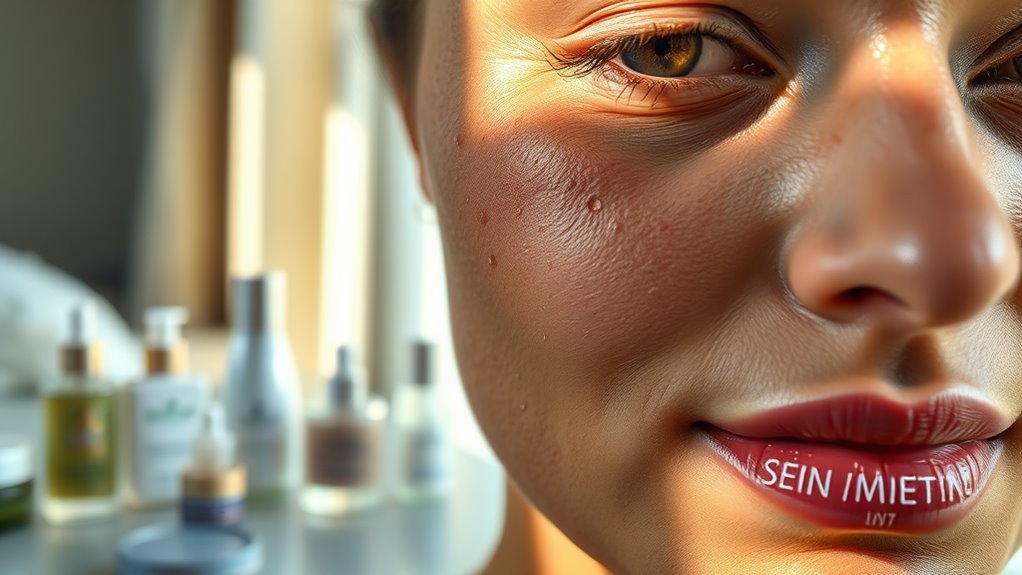Why Your Skin Feels Greasy by Noon – And What to Do About It
Your skin feels greasy by noon due to a mix of hormonal fluctuations, environmental factors, and potentially inadequate skincare routines. Testosterone and cortisol can boost oil production, while humidity or pollution aggravates the problem. Improper cleansing or using heavy products further contributes to excess sebum. To combat this, consider adjusting your skincare routine with gel-based cleansers and lightweight moisturizers. Understanding these factors can help you maintain a balanced complexion throughout the day. Explore effective solutions to tackle oily skin further.
Key Takeaways
- Oily skin may result from genetics, hormonal fluctuations, and environmental factors like humidity and pollution.
- Stress increases cortisol levels, leading to heightened oil production; managing stress can help reduce greasiness.
- Unsuitable skincare products may trigger excess sebum production; opt for gel-based cleansers and oil-free moisturizers.
- Regular exfoliation with chemical exfoliants can prevent clogged pores, minimizing midday oiliness.
- Staying hydrated and maintaining a balanced diet can regulate sebum production and improve overall skin health.
Understanding Oily Skin: Causes and Factors
While many people associate oily skin with adolescence, it can persist well into adulthood due to a variety of causes and factors. One significant contributor is genetics; if your parents struggled with oily skin, it’s likely you’ll too.
Environmental elements, such as humidity and pollution, can exacerbate oil production, leaving you with oily skin midday. Additionally, the products you use—ranging from cleansers to moisturizers—may not be suitable for your skin type, leading to an overproduction of sebum.
Stress also plays a vital role, as cortisol levels can trigger increased oiliness. Understanding these factors enables you to adopt more effective skincare strategies, providing you with the tools to manage your oily skin throughout the day. Furthermore, the nighttime routine you follow can significantly influence how oily your skin feels in the morning.
The Role of Hormones in Skin Oil Production
Hormones play a significant role in regulating skin oil production, and fluctuations in these hormones can lead to increased oiliness. Understanding how these changes affect your skin is crucial for managing greasiness effectively.
Here are four key hormones to consider:
-
Testosterone: Higher levels can stimulate sebaceous glands, increasing oil production.
-
Estrogen: Fluctuations may influence skin hydration and oil balance, especially during menstrual cycles.
-
Cortisol: Stress elevates cortisol, leading to excess oil as your body prepares for perceived threats.
-
Thyroid Hormones: An imbalance can alter skin metabolism, impacting oil secretion.
Additionally, maintaining a consistent skincare routine can help mitigate the effects of hormonal changes on sensitive skin and promote a balanced complexion.
Environmental Influences on Skin Greasiness
Environmental factors significantly impact how your skin behaves throughout the day, often leading to that midday greasiness you dread.
Humidity, for instance, can increase sweat and oil production, causing your skin to feel slick. Pollution introduces harmful particles that may disrupt your skin’s barrier, prompting excess oil as a defense mechanism.
Temperature changes also play a role; heat dilates pores, enhancing oil secretion.
Additionally, your workspace influences your skin’s condition. Artificial lighting and air conditioning can create a dry environment that paradoxically stimulates oil production in response.
Understanding these influences enables you to anticipate skin changes and strategize your approach, ultimately giving you greater control over your skin’s oiliness and overall health. Furthermore, being aware of the reasons behind oily skin can help you choose the right products to combat midday shine.
Skincare Routine Adjustments to Combat Oiliness
To effectively manage midday greasiness, adjusting your skincare routine is vital.
Implementing targeted changes can significantly reduce oiliness throughout the day. Consider the following adjustments:
-
Opt for a Gel Cleanser: Use a gel-based cleanser to remove excess oil without stripping your skin’s moisture.
-
Incorporate Exfoliation: Regularly exfoliate with chemical exfoliants to prevent clogged pores and control oil production.
-
Choose Oil-Free Moisturizers: Select lightweight, oil-free moisturizers that hydrate while minimizing shine.
-
Use Mattifying Products: Integrate mattifying primers or powders to absorb excess oil and enhance the longevity of your makeup.
Moreover, maintaining balance in your skincare routine is essential to prevent excess shine and support overall skin health.
Lifestyle Changes for a Balanced Complexion
While a tailored skincare routine plays a crucial role in managing oiliness, your daily lifestyle choices can significantly impact your skin’s overall balance.
Start by evaluating your diet; incorporating more whole foods and reducing sugar can help regulate sebum production. Stay hydrated, as water intake supports skin health and can mitigate excess oiliness. Including essential foods in your diet can further enhance skin radiance and balance.
Regular exercise not only improves circulation but also aids in detoxification, promoting a clearer complexion. Additionally, prioritize quality sleep; lack of rest can lead to hormonal imbalances that exacerbate oiliness.
Lastly, manage stress through mindfulness practices, as stress hormones can trigger oil production. By making these conscious lifestyle adjustments, you’ll cultivate an environment for a balanced and radiant complexion.




